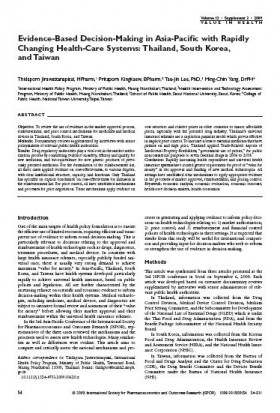This website uses cookies so that we can provide you with the best user experience possible. Cookie information is stored in your browser and performs functions such as recognising you when you return to our website and helping our team to understand which sections of the website you find most interesting and useful.
Evidence-based decision-making in Asia-Pacific with rapidly changing health-care systems: Thailand, South Korea, and Taiwan. (2009)

Details
Evidence-Based Decision-Making in Asia-Pacific with Rapidly Changing Health-Care Systems:
Thailand, South Korea, and Taiwan.
Thidaporn Jirawattanapisal1 Pritaporn Kingkaew2 Tae-Jin Lee3 Ming-Chin Yang4
1International Health Policy Program, Ministry of Public Health, Muang Nonthaburi,Thailand;
2Health Intervention and Technology Assessment Program, Ministry of Public Health, Muang Nonthaburi,Thailand;
3School of Public Health, Seoul National University, Seoul, Korea;
4College of Public Health, National Taiwan University,Taipei,Taiwan
Objective
To review the use of evidence in the market approval process,reimbursement, and price control mechanisms for medicines and medical devices in Thailand, South Korea, and Taiwan.
Methods
Documentary reviews supplemented by interviews with senior policymakers of relevant public health authorities.
Results
Drug regulatory authorities play a vital role in the market authorization process by considering evidence on safety, efficacy and quality fornew medicines, and bio-equivalence for new generic products of previously patented medicines. For the formulation of the reimbursement list, all three cases applied evidence on cost-effectiveness, to various degrees, with clear institutional structure, capacity, and functions. Only Thailand has specified an explicit benchmark on cost-effectiveness for inclusion in the reimbursement list. For price control, all have established mechanisms and processes for price negotiation. These mechanisms apply evidence on cost structure and relative prices in other countries to ensure affordable prices, especially with the patented drug industry. Thailand’s universal insurance schemes use a capitation payment model which proves effective in implicit price control. To increase access to essential medicines that have patents on and high price, Thailand applied Trade-Related Aspects of Intellectual Property flexibilities; “government use of patent,” for public noncommercial purposes to seven essential drugs in 2006 to 2008.
Conclusion
Rapidly increasing health expenditure and universal health insurance systems have created greater requirement for proof of “value for money” in the approval and funding of new medical technologies. All settings have established clear mechanisms to apply appropriate evidence in the processes of market approval, reimbursement, and pricing control.
Link: http://onlinelibrary.wiley.com/doi/10.1111/j.1524-4733.2009.00620.x/abstract




